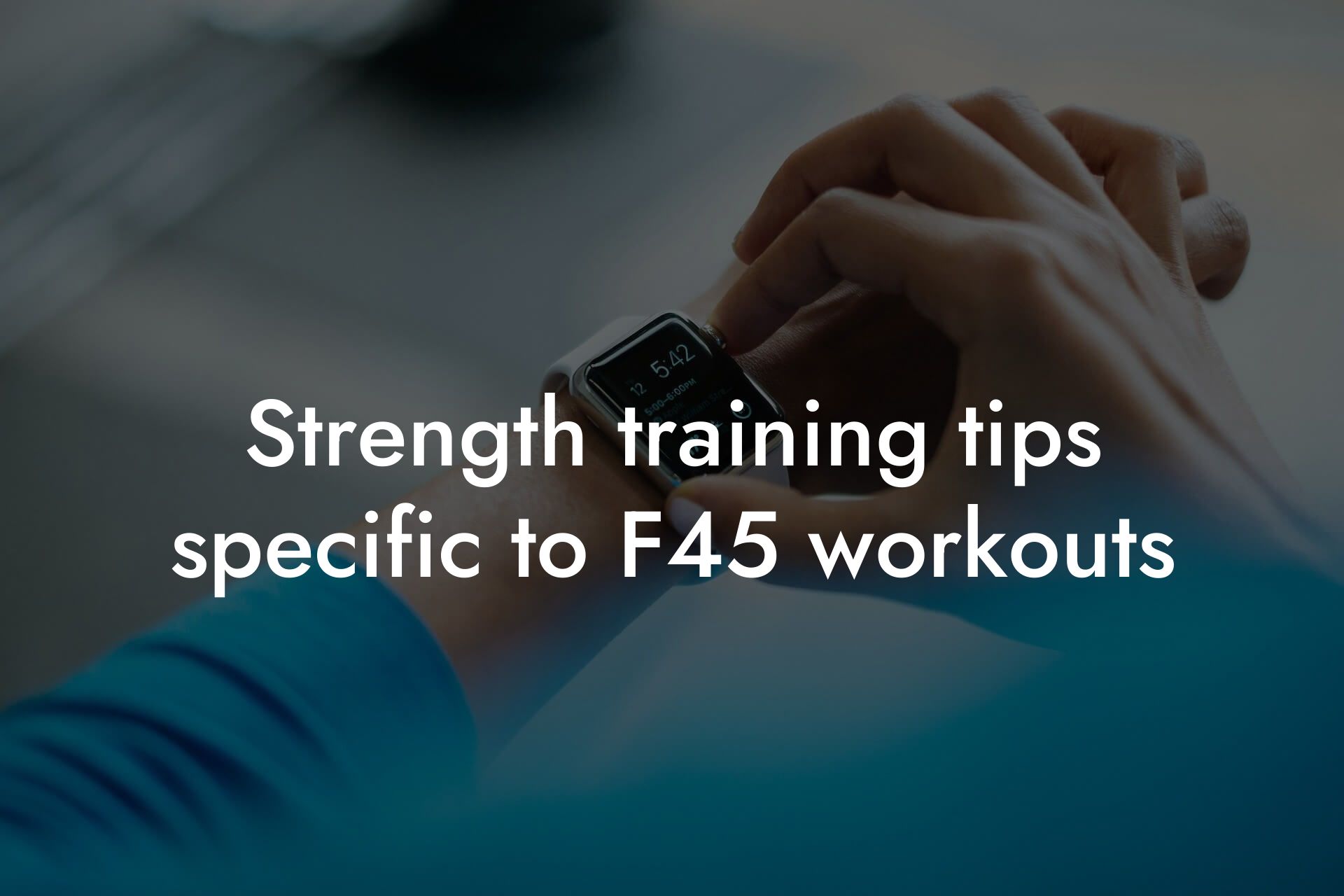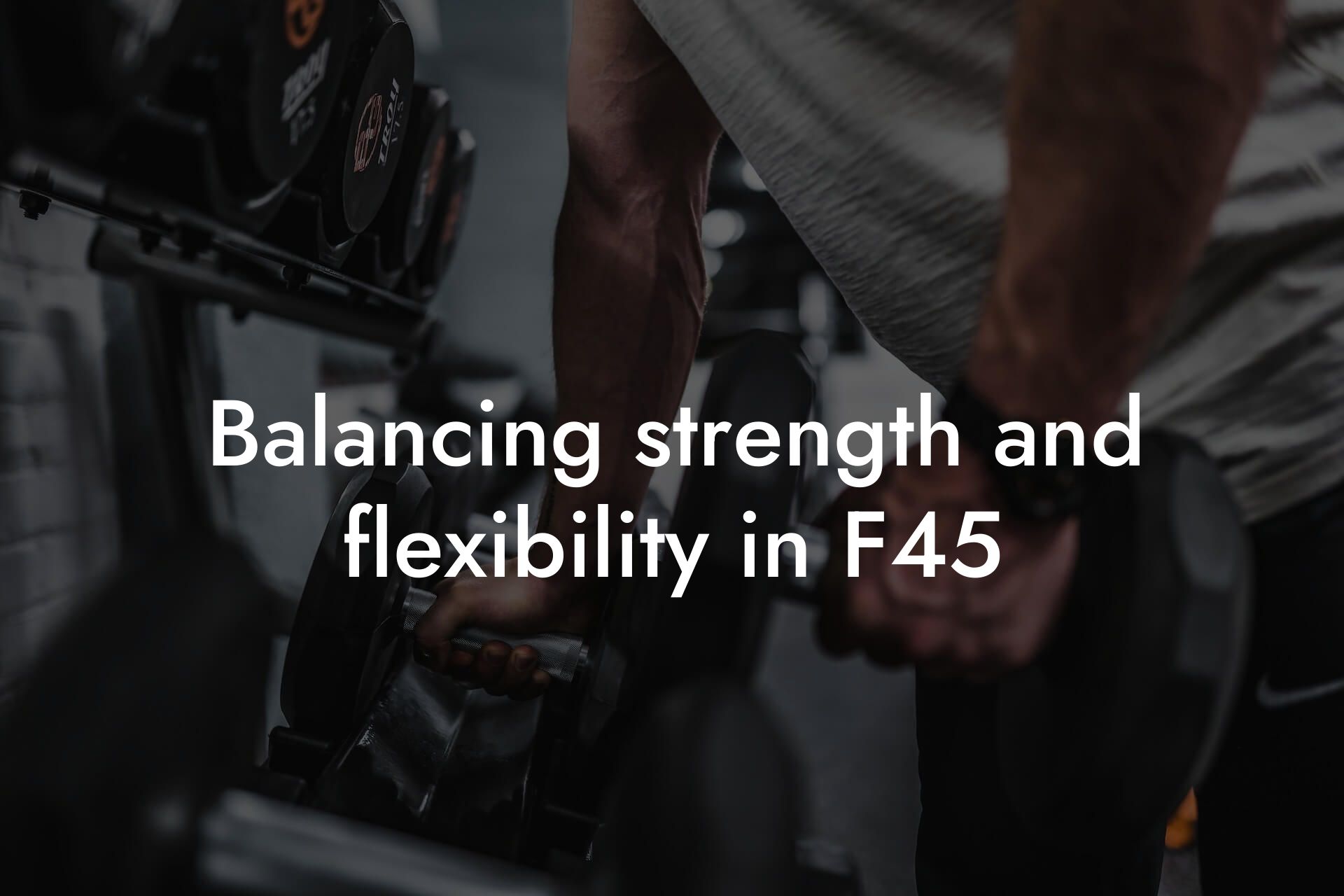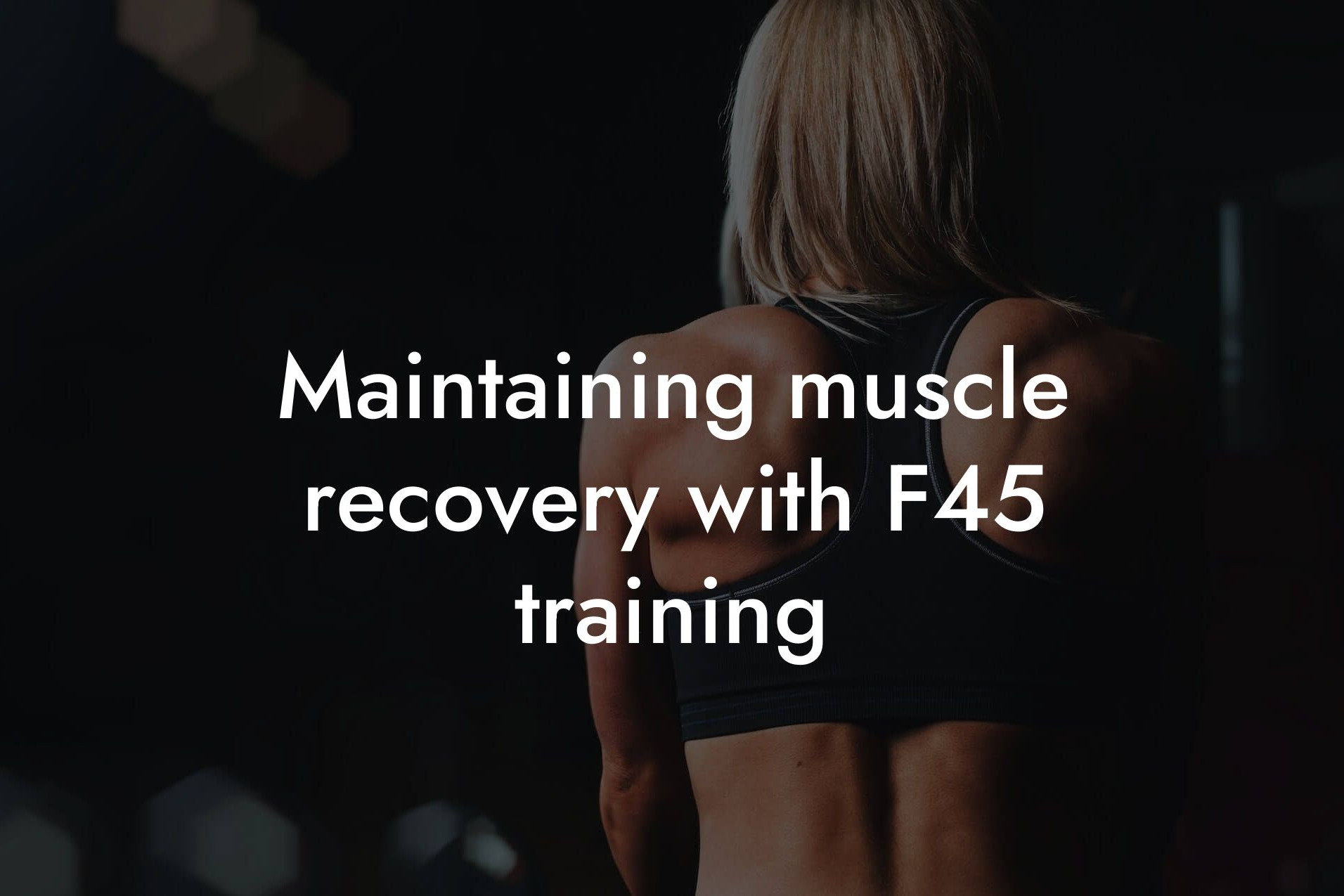As a high-earning professional, you understand the importance of maintaining a healthy and fit physique. Engaging in regular exercise, such as F45 training, is an excellent way to achieve this goal. However, it's essential to remember that fitness goes beyond just aesthetics. One crucial aspect of overall health that's often overlooked is bone density. In this article, we'll delve into the significance of bone density in F45 fitness and why it's crucial to prioritize it.
Table of Contents
What is Bone Density?
Bone density refers to the measure of how dense and strong your bones are. It's an essential indicator of your overall bone health. Peak bone density is typically reached in early adulthood, and from then on, it's a gradual decline. However, with regular exercise, a healthy diet, and adequate nutrition, you can maintain strong bones and slow down this decline.
Why is Bone Density Important in F45 Fitness?
F45 training is a high-intensity workout that involves various exercises, including weightlifting, cardio, and plyometrics. While it's an excellent way to improve cardiovascular health and build muscle, it can also put a significant amount of stress on your bones. If you have low bone density, you may be more susceptible to injuries, such as fractures or osteoporosis. By prioritizing bone density, you can reduce your risk of injury and ensure that you can continue to perform at your best.
The Risks of Low Bone Density in F45 Fitness
Low bone density can lead to a range of problems, including:
• Osteoporosis: A condition characterized by brittle and porous bones, making them more prone to fractures.
• Fractures: Weakened bones can lead to fractures, which can be debilitating and require lengthy recovery periods.
• Chronic pain: Low bone density can cause chronic pain, particularly in the back, hips, and joints.
• Decreased athletic performance: Weak bones can impede your ability to perform at your best, making it challenging to achieve your fitness goals.
How to Improve Bone Density through F45 Fitness
The good news is that F45 training can actually help improve bone density. Here are some ways to do so:
• Resistance training: Incorporate resistance exercises, such as weightlifting, into your F45 routine to strengthen your bones.
• High-impact exercises: High-impact exercises, such as jump squats and box jumps, can help stimulate bone growth.
• Progressive overload: Gradually increase the weight or resistance you're using to continue challenging your bones and promoting growth.
• Proper nutrition: Ensure you're consuming a diet rich in calcium, vitamin D, and other essential nutrients that support bone health.
How DEXA Scans Can Help
A DEXA (Dual-Energy X-ray Absorptiometry) scan is a non-invasive test that measures bone density. At Tano Performance Group, we use DEXA scans as part of our comprehensive body assessment to provide you with a detailed understanding of your bone health. With this information, you can:
• Identify areas for improvement: A DEXA scan can help you pinpoint areas where your bone density may be lacking, allowing you to target those areas with specific exercises and nutrition.
• Track progress: Regular DEXA scans can help you monitor your progress and adjust your training and nutrition accordingly.
• Reduce injury risk: By identifying potential weaknesses in your bones, you can take proactive steps to reduce your risk of injury.
Maintaining strong bones is crucial for overall health and fitness, particularly in high-intensity training like F45. By prioritizing bone density, you can reduce your risk of injury, improve your athletic performance, and ensure that you can continue to perform at your best. At Tano Performance Group, we're committed to helping you achieve your fitness goals through our comprehensive body assessments, including DEXA scans. Take control of your bone health today and unlock your full potential.
Final Thoughts
Remember, bone density is not just important for athletes or fitness enthusiasts; it's essential for everyone. By incorporating bone density exercises into your F45 routine and prioritizing nutrition, you can maintain strong bones and reduce your risk of injury. Don't wait until it's too late; take control of your bone health today and invest in your overall well-being.
Frequently Asked Questions
What is bone density and why is it important in F45 fitness?
Bone density refers to the measure of the amount of minerals, such as calcium and phosphorus, in your bones. It's an important aspect of overall health, especially in high-intensity workouts like F45 fitness. Strong bones can support your muscles and joints, reducing the risk of injuries and osteoporosis. In F45, bone density plays a crucial role in maintaining proper form and preventing fractures.
How does F45 fitness impact bone density?
F45 fitness is a high-intensity workout that involves various exercises, including weightlifting, cardio, and plyometrics. This type of exercise can help improve bone density by stimulating bone growth and strengthening muscles. However, if not done properly, F45 can also put excessive stress on joints and bones, leading to decreased bone density.
What are the risks of low bone density in F45 fitness?
Low bone density can increase the risk of fractures, osteoporosis, and joint pain in F45 fitness. Weakened bones can also lead to poor posture, decreased athletic performance, and a higher risk of injuries.
How can I improve my bone density through F45 fitness?
To improve bone density through F45 fitness, focus on exercises that involve weight-bearing activities, such as squats, lunges, and deadlifts. Additionally, incorporate exercises that target your core and glutes, as these muscles play a crucial role in maintaining good posture and reducing the risk of fractures.
What are the best exercises for improving bone density in F45 fitness?
Some of the best exercises for improving bone density in F45 fitness include squats, deadlifts, lunges, leg press, and plyometric exercises like jump squats and box jumps. These exercises stimulate bone growth and strengthen muscles, leading to improved bone density.
How often should I do F45 workouts to improve bone density?
Aim to do F45 workouts at least 3-4 times a week, with at least one day of rest in between. This allows your bones to recover and rebuild, leading to improved bone density.
What is the ideal age to start focusing on bone density in F45 fitness?
It's never too early or too late to start focusing on bone density in F45 fitness. However, peak bone density is typically reached in the mid-20s to early 30s. If you're over 30, it's essential to prioritize bone density exercises to maintain strong bones and prevent osteoporosis.
Can I improve my bone density through diet alone?
While diet plays a crucial role in maintaining strong bones, it's not enough to improve bone density on its own. A combination of a balanced diet rich in calcium and vitamin D, along with regular exercise, is essential for improving bone density.
What foods can help improve bone density?
Foods rich in calcium, vitamin D, and protein can help improve bone density. These include dairy products, leafy greens, fatty fish, and lean meats. Additionally, foods high in omega-3 fatty acids, such as salmon and walnuts, can help reduce inflammation and promote bone health.
Can supplements help improve bone density?
Certain supplements like calcium, vitamin D, and omega-3 fatty acids can help improve bone density. However, it's essential to consult with a healthcare professional before adding any supplements to your diet.
How can I track my bone density progress?
Regular bone density scans, such as DEXA scans, can help track your progress. Additionally, monitoring your workout performance, body composition, and overall health can also indicate improvements in bone density.
What are the common signs of low bone density?
Common signs of low bone density include back pain, stooped posture, fractures, and weak muscles. If you're experiencing any of these symptoms, consult with a healthcare professional for a proper diagnosis.
Can I improve my bone density if I have osteoporosis?
While osteoporosis can't be cured, it can be managed through a combination of exercise, diet, and medication. F45 fitness can help improve bone density, but it's essential to work with a healthcare professional to develop a personalized plan.
How does bone density impact my overall health?
Bone density plays a crucial role in overall health, as it affects your risk of fractures, osteoporosis, and joint pain. Strong bones can also improve your posture, balance, and athletic performance.
Can I do F45 fitness if I have a history of fractures or osteoporosis?
If you have a history of fractures or osteoporosis, it's essential to consult with a healthcare professional before starting F45 fitness. They can help you develop a modified workout plan that takes into account your bone health.
How does F45 fitness compare to other forms of exercise for improving bone density?
F45 fitness is a high-intensity workout that can be more effective for improving bone density than low-impact exercises like yoga or cycling. However, it's essential to incorporate a variety of exercises into your routine to maintain overall bone health.
Can I improve my bone density through stretching and flexibility exercises?
While stretching and flexibility exercises can help improve range of motion and reduce muscle tension, they may not be as effective for improving bone density as weight-bearing exercises like F45 fitness.
How does stress impact bone density?
Chronic stress can negatively impact bone density by increasing cortisol levels, which can lead to bone loss. It's essential to manage stress through relaxation techniques like meditation and deep breathing.
Can I improve my bone density during pregnancy?
During pregnancy, it's essential to prioritize bone health through a balanced diet and regular exercise. However, it's crucial to consult with a healthcare professional before starting or continuing any exercise program during pregnancy.
How does menopause impact bone density?
Menopause can lead to a decline in bone density due to decreased estrogen levels. It's essential for women to prioritize bone health during this stage through a combination of exercise, diet, and hormone replacement therapy if necessary.
Can I improve my bone density after menopause?
Yes, it's possible to improve bone density after menopause through a combination of exercise, diet, and hormone replacement therapy if necessary. F45 fitness can be an effective way to improve bone density during this stage.
What are the benefits of prioritizing bone density in F45 fitness?
Prioritizing bone density in F45 fitness can lead to improved overall health, reduced risk of fractures and osteoporosis, and enhanced athletic performance. It can also improve posture, balance, and body composition.
How can I get started with F45 fitness and prioritize bone density?
To get started with F45 fitness and prioritize bone density, find a local F45 studio and consult with a trainer to develop a personalized workout plan. Additionally, focus on incorporating bone-density exercises into your routine, and prioritize a balanced diet rich in calcium and vitamin D.
Here are some related articles you might love...
- Strength training tips specific to F45 workouts
- Balancing strength and flexibility in F45
- Maintaining muscle recovery with F45 training
- Nutrition strategies for F45 athletes
- Reducing body fat for better F45 workout results
- How DEXA scans can benefit F45 training enthusiasts
- Preventing injuries during F45 training
- The role of body composition in F45 training performance
- Improving endurance for F45 training sessions
Zak Faulkner
Zak Faulkner is a leading authority in the realm of physical health and body composition analysis, with over 15 years of experience helping professionals optimise their fitness and well-being. As one the experts behind Tano Performance Group, Zak has dedicated his career to providing in-depth, science-backed insights that empower clients to elevate their physical performance and overall health.
With extensive knowledge of DEXA technology, Zak specializes in delivering comprehensive body assessments that offer precise data on body fat, muscle mass, bone density, and overall physique. His expertise enables individuals to make informed decisions and achieve their fitness goals with accuracy and confidence. Zak’s approach is rooted in a deep understanding of human physiology, combined with a passion for helping clients unlock their full potential through personalised strategies.
Over the years, Zak has earned a reputation for his commitment to excellence, precision, and client-focused service. His guidance is trusted by top professionals who demand the best when it comes to their health. Whether advising on fitness programs, nutritional strategies, or long-term wellness plans, Zak Faulkner’s insights are a valuable resource for anyone serious about taking their health and fitness to the next level.
At Tano Performance Group, Zak continues to lead our Content Team revolutionising how professionals approach their physical health, offering unparalleled expertise that drives real results.




